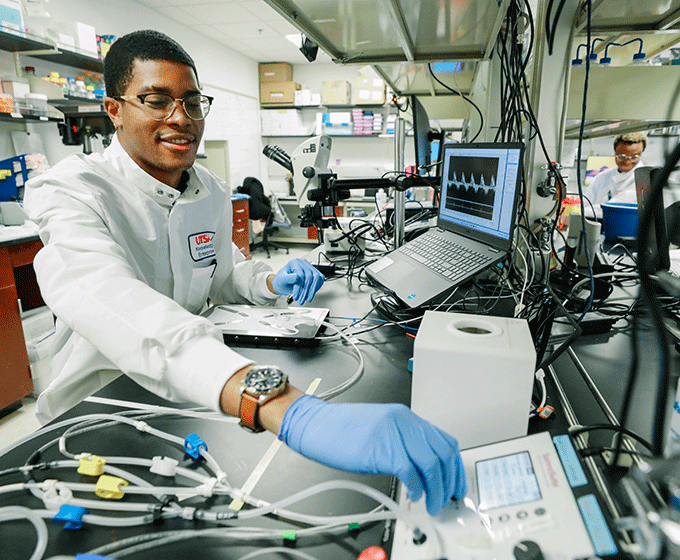
DECEMBER 20, 2022 — The UTSA Office of the Vice President for Research, Economic Development, and Knowledge Enterprise (REDKE) has created five new Research Interest Groups (RIGs) to provide a collaborative platform for UTSA researchers and the extended research community to work on emerging transdisciplinary fields in academia. The new groups build on the success of three inaugural RIGs launched over a year ago.
Most of the RIGs are driven by large, institutional research initiatives. Some of the established RIGs have representatives from the university’s key cluster hiring programs alongside collaborating researchers such as UT Health San Antonio, the City of San Antonio, Morgan’s Wonderland and Southwest Research Institute. The RIGs meet once a month and are self-governing with management support from REDKE.
“With more than 160 faculty researchers collaborating across eight distinct fields of research, the Research Interest Groups show how important transdisciplinary research is in addressing global grand challenges,” said Siobhan Fleming, REDKE’s senior director for research development. “Every college is represented in the RIGs, with members focused on obtaining funding to advance their research.”
REDKE has convened five new research interest groups in the past year:
The members are organizing the Cyber-Physical Systems & Internet-of-Things Week, which would bring five worldwide top conferences—Hybrid Systems: Computation and Control, International Conference on Cyber-Physical Systems, Internet of Things Design and Implementation, Information Processing in Sensor Networks (IPSN), and the Real-Time and Embedded Technology and Applications Symposium—to UTSA in May 2023. Sponsorship options are available and interested parties should contact the RIG.
As a result of the R&D League symposium last year, members from the Disabilities RIG formed a collaborative team comprised of nine women from various organizations including the City of San Antonio, disabilitySA, UTSA, and the San Antonio Area Foundation. Led by Melanie Cawthorn, director of disABILITYsa, the team worked on an initial grant proposal. Emerging from that experience, Cawthorn and Neely applied for a year-long intensive training program in Community-Based Participatory Research (CBPR). The two researchers then applied their knowledge and were successful in securing a Texas Council for Developmental Disabilities (TCDD) grant to create curricula to equip people with disabilities how to actively participate in research. This one-year, $150,000 grant will be led by disABILITYsa with UTSA providing the research and evaluation support.
UTSA’s new RIGs build on REDKE’s success with three inaugural teams that were launched over a year ago. Those inaugural research groups include:
Additional SECLA members who presented at the conference include Kristen Brown, professor of civil and environmental engineering, Yongli Gao, professor of earth and planetary sciences, Yeager, Rebecca Bria, and Kathryn Brown, professors of anthropology, Nathan Richardson, professor of modern languages and literatures, and Catherine Nolan-Ferrell, professor of history.
“Establishing and investing in the Research Interest Groups was a way to demonstrate our maturation as a Carnegie R1, or very high research activity, institution. RIGs facilitate the increasingly complex transdisciplinary research that funding agencies are interested in supporting. RIGs have also broadened our institutional research impact,” said Jaclyn Shaw, UTSA interim vice president for REDKE.
UTSA Today is produced by University Communications and Marketing, the official news source of The University of Texas at San Antonio. Send your feedback to news@utsa.edu. Keep up-to-date on UTSA news by visiting UTSA Today. Connect with UTSA online at Facebook, Twitter, Youtube and Instagram.
Move In To COLFA is strongly recommended for new students in COLFA. It gives you the chance to learn about the Student Success Center, campus resources and meet new friends!
Academic Classroom: Lecture Hall (MH 2.01.10,) McKinney Humanities BldgWe invite you to join us for Birds Up! Downtown, an exciting welcome back event designed to connect students with the different departments at the Downtown Campus. Students will have the opportunity to learn about some of the departments on campus, gain access to different resources, and collect some giveaways!
Bill Miller PlazaJoin us for an intimate evening of cocktails, conversation, and culinary inspiration with Pati Jinich, Emmy-nominated chef and James Beard Award-winning author. Enjoy light bites and signature drinks in the warm, modern setting of Mezquite as Pati connects with guests over her passion for Mexican cuisine and storytelling.
Mezquite Restaurant in Pullman Market, 221 Newell Ave., San Antonio 78215From inspired courses to thoughtful pairings and a rich sense of community, the Ven a Comer Signature Dinner is a night of shared meals, shared stories, and unforgettable flavor.
Stable Hall (Pear Brewery), 307 Pearl Pkwy, San Antonio 78215Come and celebrate this year's homecoming at the Downtown Campus with food, games, giveaways, music, and more. We look forward to seeing your Roadrunner Spirit!
Bill Miller PlazaThe University of Texas at San Antonio is dedicated to the advancement of knowledge through research and discovery, teaching and learning, community engagement and public service. As an institution of access and excellence, UTSA embraces multicultural traditions and serves as a center for intellectual and creative resources as well as a catalyst for socioeconomic development and the commercialization of intellectual property - for Texas, the nation and the world.
To be a premier public research university, providing access to educational excellence and preparing citizen leaders for the global environment.
We encourage an environment of dialogue and discovery, where integrity, excellence, respect, collaboration and innovation are fostered.